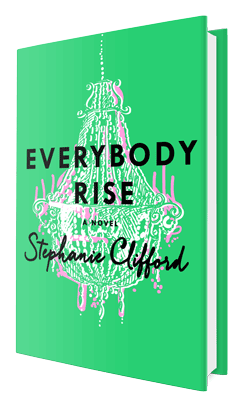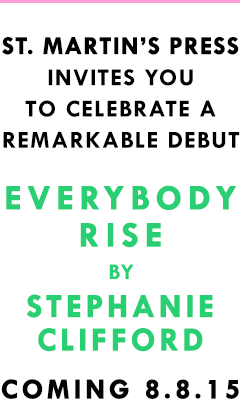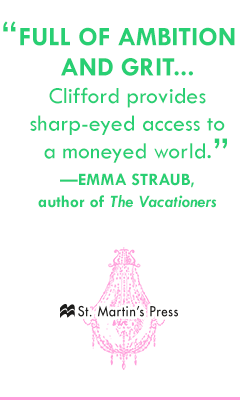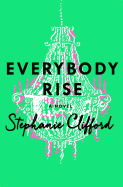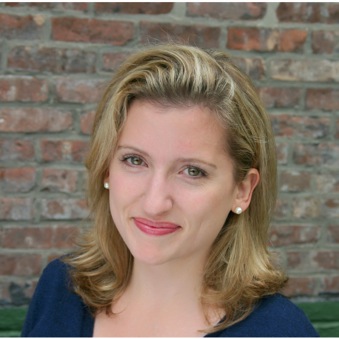 |
| photo: Jerry Useem |
Stephanie Clifford is a Loeb Award-winning reporter at the New York Times. She grew up in Seattle and graduated magna cum laude from Harvard. She lives in Brooklyn with her husband, son and two cats. Everybody Rise is her first novel.
When did the journalism bug bite first you?
I wanted to be a journalist since I was a little kid--I was constantly boring my parents with my handwritten "newsletters" on goings-on around our house ("Tonight for dinner: fettuccine alfredo!"). I love being a reporter. It's an absurdly fun job: you can pick virtually anything in the world you're curious about, go talk to smart people who understand it, then explain it to readers.
And the book?
The book came from a similar impulse. All writers, including journalists, write in order to make sense of the world. I was living in New York during an incredibly interesting, volatile time. I wanted to put together what I was seeing and what people were going through in order to understand that time better.
Working as a journalist, I write the world in 1,100-word installments. I wanted to see if I could pull back and do something bigger, something that followed characters as they were challenged and they changed. Most of all, I wanted to write the kind of book I love to read: smart, funny and fast-moving.
In transitioning to this longer format, how did your journalism background help you?
Being a reporter with a regular beat forces me to write almost every day, whether I want to or not. That discipline is so useful in overcoming the fear of the blank page. Being a reporter also exposes you to the wider world. I've covered media, business and now the legal system, and each stop forced me to learn about a new subculture and the rules, hidden or not, that govern it.
What did surprise me was how much reporting helped with dialogue in the novel. As a reporter, I spend a good part of my day writing down precisely what people say, and that helps develop an ear for speech patterns, rhythm and particularly for the idiosyncrasies of speech. Understanding how people talk--what they choose to say, how they say it and even what they choose not to say--is critical to understanding character, real or imagined.
The biggest difference between reporting and writing fiction is that writing fiction gives you a lot more room to adjust--if a character isn't working, you can toss her out. I don't think my editors at the Times would be pleased if I did that in the paper.
You first had the idea for the novel a decade ago. What sparked it?
The New York narrative is you come here to make it big, and three months after your arrival you're skipping down Broadway in expensive shoes. I wanted to write about what it's like to come to a big city and struggle, which I did.
I arrived here after two years of working at a magazine in San Francisco, and thought my career would continue moving forward. It didn't. I couldn't get a job for two years. I freelanced, but I could barely pay my bills, and I felt like I was falling behind as my friends were surging ahead. I seriously considered giving up the career I loved and leaving the city altogether.
I didn't see that struggle reflected much in movies or TV or books about New York or really about any city, Dallas or Denver or St. Louis. Cities are hard and cities are competitive. Not everybody makes it. So I gave my protagonist, Evelyn, a similar struggle, but I increased the stakes. She believed that she had a decent support system and enough family money to succeed in New York. What would happen if that support collapsed and the family money evaporated? I wanted to see what kind of decisions the pressure might force her to make.
I had also been interested in the intersection of class and money since I left Seattle, where old money basically means you worked on Windows 95. I came east to go to boarding school and I was surprised to find that there were families with old and important names that still held a lot of social power, even if their fortunes weren't that big anymore. Americans like to believe we live in a meritocratic age, but these families suggested we haven't progressed that far.
Americans, not just New Yorkers, have a fraught relationship with class, money and power. We believe we're living in a world where anyone can grow up to be president, yet we find again and again that entrenched interests seem to hold the power. Class, ambition and money were all colliding in the run-up to the 2008 recession and I thought it was the perfect time to capture these themes.
You've been "quietly writing" in the early mornings for four years while still working--and with a little one at home.
Many of my colleagues assumed that I wrote the book on maternity leave. Absolutely not. Like a lot of new mothers, I thought I would have all the time in the world on leave; that myth was quickly dispelled. I barely wrote a word during those months.
To write the book, I tried to be methodical; to reduce the stress of writing, I tried to turn writing into a habit. So I got up every morning and sat in front of my computer for two hours. I wasn't allowed to criticize what I did during that time. Some days, I'd literally sit there for two hours and type a single word, but I always told myself, "You got up, you sat there, and that's just fine. You're closer today than you were yesterday."
Your work has been compared to Edith Wharton and Tom Wolfe. What's your initial reaction?
My initial reaction is to worry that they'll sue me for defamation of character. I still don't entirely believe the book is going to be a real object in real readers' hands. So those comparisons are incredibly flattering and terrifying.
I can't overstate my debt to Edith Wharton. House of Mirth was the first adult book I fell hard for, and her descriptions of social roles are unnerving and captivating. Lily Bart and Evelyn are similar in a lot of ways, and part of what I thought about as I wrote Evelyn is what would happen if I put Lily in today's world, where women don't have to depend on men for a living. And what would happen if the laudanum Lily takes at the end of House of Mirth didn't work? Where would Lily go next? Those were key starting points for creating Evelyn.
There isn't a journalist alive who doesn't owe a huge debt to Tom Wolfe. He revolutionized journalism and he has such an eye for the powerful, telling detail. He also taught journalists to think big, to get to the heart of the biggest stories. If there's even a glimmer of Edith Wharton or Tom Wolfe in Everybody Rise, I'll consider myself blessed.
How did you approach writing about this elite part of the population?
I have some familiarity with this group from boarding school and, to some degree, from New York, but it's certainly not my circle. I'm a reporter, though, so I reported it out. I spent time with women who were involved in the Upper East Side social scene to understand everything from what they valued to how they spoke. In the Adirondacks, I paid attention to how the summer season worked. I read sociology articles about this world, and devoured writers like Louis Auchincloss (who is immensely underrated, in my opinion) who described its mores. All that helped inform Everybody Rise.
I also decided early to make Evelyn Beegan an outsider so that the reader learns along with her about this strange world.
The novel takes place prior to the stock market crash. If you moved it 10 years ahead, how would that have changed things?
I think the stock-market crash and the recession that followed is an incredible subject, a huge subject, that's going to be a theme in novels and films for years to come. I was covering the fallout of the economic crisis at the Times, and was struck by how much that crisis changed things. For me, it's like writing about the Titanic: you wouldn't start after the ship hit the iceberg.
I focused on one particular slice of society at that time, but there are so many others. The lower- and middle-class homeowners who were on the other end of the subprime loans that Scot and Nick (in the book) are making money off of saw their credit ruined and their houses repossessed. The effect of that recession on whole parts of the country and, I think, on the psyche and politics of the United States, is really incredible. There's a lot of resentment toward the wealthy these days, and much of it is well-earned. They didn't get hurt in nearly the same way as the middle and lower classes, but it's hard to say that the view of the American upper class hasn't changed in the last seven years.
Evelyn spends a lot of time wondering who qualifies in society, who gets disqualified and who gets punished when things fall apart. I think that's a feeling that many people can sympathize with, especially after the past seven years.
Do you share any attributes with Evelyn or your other characters?
I share attributes with a lot of the characters. I share some of the determination and work ethic of Charlotte, who is Evelyn's friend and sometime judge. I have some nerdy qualities in common with Scot, Evelyn's slightly awkward boyfriend. I even share some characteristics with Evelyn's mother, an important character in the book and not a very sympathetic one.
The trait I share most with Evelyn is her feeling that she's an outsider. With Evelyn, though, I wanted to make that feeling so acute that she would do--and does do--almost anything in order to fit in.
But most of the characters came out of reporting, rather than out of my direct experience. Take Evelyn's father, the plaintiff's lawyer: I've spent a lot of time in courts watching lawyers, including class-action lawyers, perform. That's where the character of Evelyn's father took shape. I've seen Southern plaintiff's lawyers come into these Brooklyn courtrooms where you think their aw-shucks, li'l-old-me demeanor isn't going to fly with hardened New Yorkers--and lo and behold, the jurors are utterly charmed.
How did the title--derived from "Ladies Who Lunch"--come about?
I am a Stephen Sondheim freak--I'll sometimes realize I'm muttering the words to "(Not) Getting Married Today" aloud during my commute. In "Company," the musical this song appears in, Sondheim writes about New Yorkers trying--and failing--to connect. I thought that got at Evelyn's essential flaw so well--she gets so obsessed by this old-money world that she forgets what can make her happy. The title Everybody Rise also, I hope, evokes that feeling of New York just before the crash, when money was easy and power seemed accessible to all and everyone, or almost everyone, was climbing ever higher.
Where do you go from here?
It all continues to seem surreal. But the simple answer is back to work. On the day the book went to auction, I was writing a daily story about a political corruption trial. As my agent called to say, "We have the offer from St. Martin's," the Times copy desk was calling on the other line to ask "Were these papers filed in Supreme Court or Criminal Court?" It was a little crazy, though a good kind of crazy. One other useful thing newspapers teach you is you can't indulge much in patting yourself on the back, because tomorrow you're going to get up and do it all over again. --Jen Forbus



